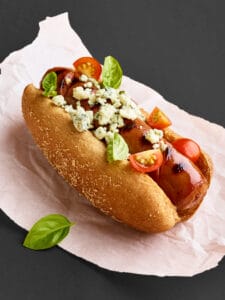Nature based solutions to replace artificial colors
Consumer awareness of food, health, and other household products is growing and with that, the demand for naturally derived, plant-based colors is soaring.
ResilientRed BF is setting out to be a great solution for manufacturers who wish to replace artificial reds in their recipes.
The use of red dye No. 3, a synthetic dye derived from petroleum, has been a topic of concern in the United States. With multiple states introducing and voting in bans and restrictions on the use of red 3, manufacturers have to start thinking about alternatives.
California has taken the lead by announcing a ban on the use of red dye No. 3 starting in 2027. The dye is commonly used in candies and food products to provide a strong red hue, but it has been associated with health concerns. California’s Environmental Protection Agency found evidence linking the dye to behavioral problems in children, and studies have indicated potential effects on memory and learning.
Other countries and regulatory agencies have also expressed concerns and some have banned its use. As a response to these concerns, multiple states are considering or introducing bills to ban the use of red dye No. 3.
New York, Illinois, Missouri, South Dakota, and Washington are also taking steps to address the issue.
The California ban and potential bans in other states could have significant implications for the food industry, especially in California, which is a major food market in the US. Companies offering products containing red dye No. 3 may face considerable losses, and the import and export of food products may be impacted. In response to the ban, companies are exploring alternatives to artificial red dyes. Some are already offering products without the controversial red dye, catering to the growing concerns of parents about the ingredients in their children’s food. One potential alternative highlighted in the text is Lycored’s lycopene-based colors, which are presented as a suitable solution for achieving red hues in various applications.
As consumers are becoming more partial to wholesome and more natural ingredients in their foods, ResilientRed BF comes as a potential alternative to more controversial food ingredients. Derived naturally from Lycored’s own tomatoes, the new color brings new opportunities to the market as it is sugar ester and palm oil-free, opening it to Whole Foods and other ingredients-conscious markets.
Because it is derived naturally from tomatoes, ResilientRed BF can be labeled as “Color: Lycopene or Lycopene” in the US and “Colour: Lycopene or Colour: Lycopene from red tomatoes” in the EU.
Additionally, like all the colors in our collection, ResilientRed BF is also vegan-friendly, non-GMO, light, heat, and pH stable, and certified Kosher and Halal.
Some manufacturers may understandably be nervous about reformulating their recipes in favor of more wholesome color products if color is part of their product’s branding and identity. However, in many applications, ResilientRed BF can replace less desired color products seamlessly.
For the products that will show a slight difference in shade or hue, our research has shown that consumers are open to see some changes to their products if that means that the colors are more wholesome than the artificial alternatives.
Learn more about how ResilientRed BF can help replace controversial red dyes here. Reach out today to one of our team members to find out if that may be the right solution for your product.

Consumer awareness of food, health, and other household products is growing and with that, the demand for naturally derived, plant-based colors is soaring.

Supplements aren’t going anywhere, and with bustling nutraceutical trends, manufacturers need to keep on top of consumer demands. Understanding Today’s Nutraceutical Trends and Consumer The supplements industry has gone through...

January 15th 2025, the FDA announced that they would be revoking their authorizations for Red No. 3 in food and ingested drugs. The Lycored team comments on the situation.
Interested in speaking directly with a member of our team?
Click below to get in touch.